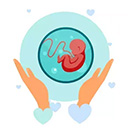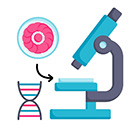What to Do After an IVF Transfer: Your Ultimate Guide to Boosting Success
So, you’ve just had your IVF embryo transfer. Congratulations on making it this far! It’s a huge step, and now you’re probably wondering what comes next. The two weeks after your transfer—often called the “two-week wait”—can feel like an emotional rollercoaster. You might be asking yourself: What can I do to help this work? What should I avoid? How do I stay sane while waiting? Don’t worry—I’ve got you covered. This guide is packed with practical tips, science-backed advice, and a few fresh ideas you won’t find everywhere else. Let’s dive in and make this time as smooth and hopeful as possible.
The Basics: What’s Happening in Your Body Right Now?
After your embryo transfer, your body is gearing up for a big moment: implantation. This is when the embryo attaches to the lining of your uterus, hopefully starting a pregnancy. It usually happens 6-10 days after the transfer, depending on whether it was a fresh or frozen embryo and its development stage (like day 3 or day 5 blastocyst). Your doctor has likely given you progesterone to support this process, calming your uterus and thickening the lining. Think of it like preparing a cozy bed for your embryo to settle into.
But here’s the catch—it’s not all up to you. A lot depends on the embryo’s quality and your body’s response, which can feel frustratingly out of your control. That said, there are still plenty of ways to support your body and mind during this time. Let’s break it down step by step.
Your Day-by-Day Plan After the Transfer
The first few days after your transfer are key. While you don’t need to lie flat for weeks (more on that later), a little extra care can go a long way. Here’s a simple timeline to guide you through the first week.
Day 1-2: Rest, but Don’t Overdo It
The day of your transfer, you’ll probably feel a mix of excitement and nerves. Your clinic might suggest resting for the rest of the day, and that’s a good idea. But here’s something surprising—studies show strict bed rest doesn’t improve success rates. A 2013 study in Fertility and Sterility found no difference in pregnancy outcomes between women who rested for 24 hours versus those who resumed normal activities right away. So, take it easy, but don’t feel chained to your couch.
- ✔️ Do: Nap, watch your favorite show, or read a book. Keep your feet up if it feels good.
- ❌ Don’t: Jump into heavy chores or hit the gym. Skip lifting anything over 10 pounds—like that big laundry basket.
Day 3-5: Ease Back into Life
By now, your embryo is likely starting to burrow into your uterine lining. You can move around more, but keep things low-key. Think gentle walks or light stretching—nothing that makes you sweat buckets.
- ✔️ Do: Sip water all day to stay hydrated. Aim for 8-10 glasses.
- ❌ Don’t: Soak in a hot tub or sauna. Heat can raise your core temperature, which might stress your body.
Day 6-10: Support Implantation
This is the implantation window! Your embryo is either settling in or not, and while you can’t force it, you can create the best environment possible.
- ✔️ Do: Eat nutrient-rich foods (more on this soon).
- ❌ Don’t: Stress about every twinge. Cramping or spotting can be normal—or not. It’s too early to tell.
Eating for Success: Your Post-Transfer Diet
Food matters more than you might think after an IVF transfer. Your body needs the right fuel to support implantation and early pregnancy. Forget crash diets or cutting carbs—now’s the time for balance and nourishment. Here’s how to build your plate.
Load Up on Implantation-Friendly Foods
Focus on foods that reduce inflammation and boost blood flow to your uterus. A 2021 study from the Journal of Human Reproductive Sciences suggests a Mediterranean-style diet—rich in fruits, veggies, and healthy fats—may improve IVF outcomes.
- Fruits and Veggies: Think berries, spinach, and sweet potatoes. They’re packed with antioxidants that protect your cells.
- Protein: Eggs, chicken, lentils, or tofu help repair tissue and keep you strong.
- Healthy Fats: Avocado, nuts, and olive oil support hormone production.
Hydration Is Your Secret Weapon
Staying hydrated keeps your blood flowing smoothly, which is great for your uterus. Plus, all those IVF meds can leave you feeling parched. Aim for water, herbal teas (like chamomile), or even coconut water for a boost of electrolytes.
Foods to Skip
Some things can throw your body off balance. Here’s what to avoid:
- ❌ Caffeine Overload: A cup of coffee is fine, but more than 200 mg (about two cups) might mess with implantation, according to a 2019 American Journal of Obstetrics & Gynecology study.
- ❌ Processed Junk: Sugary snacks or fast food can spike inflammation.
- ❌ Raw Risks: Skip sushi or unpasteurized cheese to avoid bacteria like listeria.
Sample Meal Plan
Need ideas? Here’s a day of eating to get you started:
- Breakfast: Greek yogurt with berries and a drizzle of honey.
- Lunch: Grilled chicken salad with spinach, avocado, and olive oil dressing.
- Snack: Handful of almonds and an apple.
- Dinner: Baked salmon with quinoa and steamed broccoli.
The Medication Maze: Stick to the Plan
Your doctor probably prescribed progesterone—maybe as shots, pills, or suppositories. It’s not glamorous, but it’s crucial. Progesterone keeps your uterus ready for implantation and early pregnancy. A 2022 review in Reproductive Biology and Endocrinology found that consistent progesterone use post-transfer boosts success rates by up to 10%.
- ✔️ Tip: Set phone reminders so you never miss a dose.
- ❌ Warning: Don’t stop early, even if you feel bloated or moody. Talk to your doctor first.
What about other meds? If you’re on aspirin, thyroid meds, or something else, keep taking them unless your clinic says otherwise. Always double-check with your team—they know your case best.
Moving Your Body: What’s Safe, What’s Not
Exercise is tricky after a transfer. You don’t want to overdo it, but staying active can help your mood and circulation. Here’s the scoop.
Yes to Gentle Movement
Light activity keeps your blood flowing without stressing your body. A 2020 study in Human Reproduction found that moderate movement (like walking) didn’t hurt IVF success rates—and might even help by reducing stress.
- ✔️ Try: A 15-minute stroll around your neighborhood or some easy yoga poses (skip the twists).
- ❌ Avoid: Running, jumping, or anything that jostles your pelvis.
Why Skip the Heavy Stuff?
Your ovaries might still be swollen from stimulation, and intense workouts could twist them (a rare but painful risk called ovarian torsion). Plus, vigorous exercise might trigger uterine contractions, which you want to avoid right now.
A Quick Quiz: Are You Overdoing It?
Take a second to check in with yourself:
- Are you sweating a lot or breathing hard?
- If yes, scale it back.
- Do you feel pelvic pressure or pain?
- If yes, stop and rest.
- Are you enjoying it, or pushing through?
- Stick to what feels good.
The Emotional Side: Handling the Two-Week Wait
Let’s be real—the waiting is brutal. You’re dying to know if it worked, but testing too soon can mess with your head. Here’s how to cope.
Why Early Testing Is Risky
Those pregnancy tests at the drugstore? They detect hCG, the pregnancy hormone. But the trigger shot from your IVF cycle (if you had one) can linger in your system for 10-14 days, giving a false positive. A 2023 study in Fertility Research and Practice showed that testing before day 12 often leads to inaccurate results. Wait for your clinic’s blood test—it’s worth it.
Stress Less, Live More
Stress won’t ruin your chances, but it can make you miserable. A 2021 Journal of Psychosomatic Obstetrics & Gynecology study found that women who practiced relaxation techniques during the two-week wait reported better emotional well-being, even if the outcome wasn’t positive.
- ✔️ Try This: Deep breathing—inhale for 4 seconds, hold for 4, exhale for 4. Repeat 5 times.
- ❌ Skip This: Obsessing over every symptom. Cramping could mean implantation—or your period. Let it go for now.
Fun Distractions
Keep your mind busy with stuff you love:
- Binge a silly show (nothing too intense).
- Start a puzzle or craft project.
- Call a friend who gets it.
Sleep: Your Underrated Ally
Sleep isn’t just for feeling good—it’s a game-changer for your hormones and recovery. A 2024 study in Sleep Medicine linked poor sleep after IVF transfers to lower implantation rates, possibly due to stress hormone spikes.
How to Sleep Better
- ✔️ Set a Routine: Aim for 7-9 hours, same time every night.
- ✔️ Wind Down: No screens an hour before bed—try a book instead.
- ❌ Avoid: Late-night caffeine or heavy meals.
Can Position Matter?
Nope! There’s no evidence that sleeping on your back, side, or stomach affects implantation. Get comfy and rest up.
Three Fresh Takes You Haven’t Heard
Most articles stick to the basics—rest, eat well, take your meds. But let’s dig deeper with some ideas that don’t get enough airtime.
1. Your Gut Health Connection
Your gut microbiome—the bacteria living in your digestive system—might play a role in IVF success. A 2023 study in Nature Communications found that women with a balanced gut microbiome had higher implantation rates. Why? A healthy gut reduces inflammation and supports hormone balance.
- Action Step: Add fermented foods like yogurt, kefir, or kimchi to your diet. They’re packed with probiotics to keep your gut happy.
2. The Power of Visualization
This might sound woo-woo, but hear me out. A small 2022 pilot study in Complementary Therapies in Medicine showed that women who practiced guided visualization (imagining the embryo implanting) had lower stress levels and slightly higher pregnancy rates. It’s not magic—it’s about calming your nervous system.
- Try It: Spend 5 minutes a day picturing your embryo snuggling into your uterus. Add soothing music if you like.
3. Temperature Tracking
Ever thought about your body temperature? Beyond avoiding hot tubs, keeping your core temp stable might help. A 2024 Journal of Assisted Reproduction and Genetics article noted that slight temperature fluctuations could affect early embryo development. No one’s talking about this much, but it’s worth a look.
- Tip: Use a fan or light layers at night to stay cool. Skip electric blankets for now.
What About Sex? The Big Question
Couples often wonder if sex is okay after a transfer. The short answer: probably not yet. Intercourse can cause uterine contractions (from orgasm or movement), and a 2020 Fertility and Sterility study found a small drop in success rates for women who had sex within 48 hours of transfer. Plus, there’s a tiny infection risk. Wait until your doctor gives the green light—usually after the pregnancy test.
- ✔️ Instead: Cuddle up or hold hands. Intimacy doesn’t need to be physical right now.
Spotting and Cramping: Should You Panic?
Light spotting or mild cramps freak a lot of people out, but they’re common. Implantation can cause both, and so can progesterone. A 2021 Human Reproduction Update review found that 1 in 3 women experience spotting post-transfer, pregnant or not. Heavy bleeding or severe pain? Call your clinic ASAP. Otherwise, take a deep breath—it’s not a clear sign either way.
A Poll: How Are You Feeling?
Let’s make this interactive. Pick your vibe today:
- A) Hopeful and chill
- B) Anxious but managing
- C) Climbing the walls
Drop your answer in your head (or share with a friend!). It’s normal to bounce between all three.
Late-Stage Tips: Days 11-14
As you near the end of the wait, the urge to test grows. Hold off if you can—your clinic’s blood test is the gold standard. Keep up your routine: eat well, rest, and distract yourself. If you’re feeling symptoms (sore breasts, fatigue), jot them down but don’t overanalyze. They could be from meds or pregnancy.
When It Doesn’t Work: A Gentle Note
Not every transfer ends in a positive test, and that’s okay. A 2023 BMJ Open study found that 60% of first IVF cycles don’t succeed, but many women get pregnant on later tries. If it’s a no this time, give yourself grace. Talk to your doctor about next steps—sometimes small tweaks make a big difference.
Wrapping It Up: You’ve Got This
The two-week wait is a marathon, not a sprint. You can’t control everything, but you can give your body and mind the best shot. Eat smart, move gently, sleep well, and lean on your support crew. Add in a little gut love, some visualization, and a cool head (literally), and you’re doing more than most. Whatever happens, you’re stronger than you know. Hang in there—you’re not alone on this ride.







